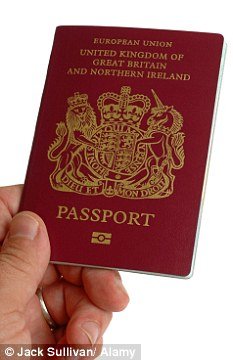For many years, British passport applicants have been required to provide details of their mother and father; now, after pressure from the gay rights group lobby, the new PC passports will be given the option of naming “parent 1” and “parent 2”.
The change, which is due to take place by December 2011, has been made following claims the original form was “discriminatory” and failed to include same-sex couples looking after a child.
It has led to claims the official travel document is being turned into a “PC passport”.
Campaigners for family values said the move “denigrated” the roles of parents bringing up children in traditional families.
Norman Wells, director of the Family Education Trust, said:
“Fathers and mothers are not interchangeable but have quite distinct roles to play in the care and nurture of their children.
“To speak of <<parent 1>> and <<parent 2>> denigrates the place of both fathers and mothers.
“Much as the equality and diversity social engineers might wish it were otherwise, it still takes a father and a mother to produce a child.”
The decision follows the revelation last month that details of the holder’s sex could be erased from all passports to spare transgender people from embarrassment.

The latest shift follows lobbying from gay rights groups, who argue that the current passport application form fails to recognize same-sex couples who are both officially registered as a child’s parents.
The Home Office “Diversity Strategy” states: “IPS [the Identity and Passport Service] is working with Stonewall [the gay rights group] in response to an issue about having to name a “mother” and “father” on the passport application form.”
Gay couples are registered as the official parents of any child they adopt. Those who use surrogate mothers must apply to the courts for a “parental order” in order to be recognized as a child’s official parents.
Similar changes have been made in recent months to passport application forms in the U.S., outraging traditional family groups and religious conservatives.
British officials accepted that the move was made following lobbying from gay rights groups who claimed it was discriminatory.
A spokesman for the UK Identity and Passport Service insisted it was necessary to incorporate same-sex parents on the form so that accurate information is collected.
“IPS is planning to amend the application form and associated guidance to deal with same-sex parents applying for a passport on behalf of a child.
“Currently, the application form provides the relevant boxes of <<mother>> and <<father>> to be completed.
“The new form to be introduced by December 2011 will in addition provide for <<parent 1>> and <<parent 2>>.
“It is essential that any parent provides the necessary information on their status as parents or guardians when applying for a passport on behalf of their child.
“This protects the interests of the child and ensures that IPS is able to issue passports securely and safely to the right person.
“The passport application form is therefore being updated to incorporate same-sex parents.”
Gay lobbyists and politicians have long claimed that 10% of the population is homosexual, but figures from the Office for National Statistics in UK suggest that this is a wild exaggeration.
According to the Integrated Household Survey, homosexuals and bisexuals make up only 1.5% of the population.
1% said they were gay or lesbian, while 0.5% said they were bisexual.
More men than women declared themselves homosexual, with 1.3% of men saying they were gay compared with 0.6% of women who described themselves as lesbian.
94% said they were heterosexual, 4.3% declined to answer the question or said they did not know, and 0.4% said their sexuality was “other”.
